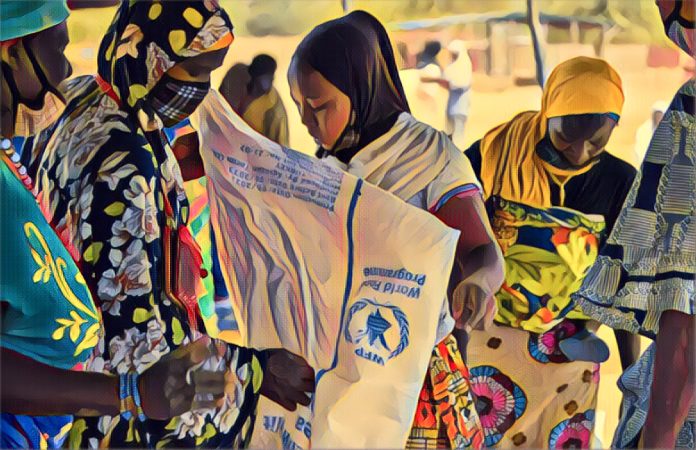The World Food Programme (WFP) has received a donation of 25,000 tons of wheat from the Government of Ukraine to provide emergency food assistance to 1.3 million people affected by conflict and hunger in northeast Nigeria.
The wheat, which arrived in Nigeria in late February, is part of Ukraine’s humanitarian “Grain from Ukraine” initiative launched by President Volodymyr Zelenskyy. The initiative aims to support countries facing food insecurity and malnutrition due to natural disasters, wars, or pandemics.
The shipment was made possible by the collaboration of several donors, including the United Kingdom, Canada, Denmark, Finland, France, Luxembourg, Norway, Republic of Korea and Sweden, who helped cover the costs of transporting the wheat from Ukraine to Nigeria and distributing it to the needy families.
A lifeline for millions
Nigeria is facing a severe food crisis, with 26.5 million people across the country projected to face acute hunger during the 2024 lean season, according to the November 2023 Cadre Harmonisé food security analysis.
The situation is especially dire in northeast Nigeria, where deadly conflicts and persistent violence have driven millions of people out of their homes, off their farms, and across the region, jeopardizing agriculture and livelihoods.
Up to 4.4 million people in the states of Borno, Adamawa and Yobe will require food assistance during the June-August 2024 lean season, with over 1 million people facing emergency levels of hunger, the analysis shows.
The wheat donation will be combined with cash and other commodities to meet the basic food and nutrition needs of crisis-affected women, men and children for a two-month period.
“We extend our heartfelt thanks to the Government of Ukraine, partners, and donors for their unwavering support through the Grain from Ukraine Initiative. This collaborative effort plays a crucial role in alleviating suffering and maintaining human dignity in areas facing conflict and food price increase,” said David Stevenson, WFP’s Representative and Country Director in Nigeria.
Building resilience and self-reliance
WFP is committed to working with the government and partners to build more resilient, inclusive, and effective food systems in Nigeria, taking advantage of its current footprint in the country.
Through its “Out of Conflict into Solutions” food systems approach, WFP seeks to prioritize emergency food assistance to the most vulnerable groups while simultaneously supporting self-reliance by rebuilding assets to improve long-term food security and resilience, including adaptation to climate change, providing timely access to nutritious food, and promoting innovative financing to support WFP operations.
In 2023, for instance, WFP invested US$ 200 million in the agricultural economy through locally purchased food and cash transfers to crisis-affected families for food redemption in local markets.
“WFP has the tools and willingness to support the government in restoring and unlocking the agricultural potential of northeast Nigeria, making it again the breadbasket of the country. But we cannot achieve this alone. Collective action is needed to bring peace and stability, ensure stable markets, encourage financial investments, and generate employment through enhanced collaboration with Nigerian private sector partners, suppliers, transporters, service providers, and retailers,” Stevenson added.
But to ensure continued food and nutrition assistance to crisis-affected people in northeast and northwest Nigeria, WFP urgently requires US$154 million for the next six months (March-August 2024).
Despite the challenges and uncertainties, WFP and its partners are determined to continue their life saving work and reach the most vulnerable people in Nigeria with food and nutrition support.
Source: Vanguard



